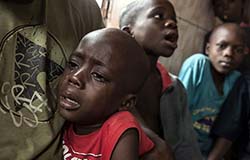

| Benin – 23,000 kilos of aid for Benin |
| Italy – Street children and interreligious dialogue |
| Benin – Foyer Don Bosco cooperating with the European Union for the protection of young people in difficulty |
(ANS - Cotonou)- Julio was abducted and sold as a slave. Joel was the leader of a gang that seized and sold children. Their story is told by Sergio Ramazzotti, who has made a report on the phenomenon of child trafficking between Benin and Nigeria for the magazine "Africa". Below are some excerpts.
Benin was once called Dahomey and was known for the quality of its slaves. But slaves are still the main export from the country: just change the age (today they are children), the means of transport (by car) and the destination (Nigeria). (...)
Joel: "In the ghettos of Cotonou everyone has their own trade - ours was taking children. We took them at night, here in the city among the street children or in villages off the beaten track". (...)
Julio: "I will never forget what happened to me. My parents were having problems with each other. One day my father told me to come with him. He said that we were going the next day to my grandmother in Nigeria." (...)
Julio worked hard to support himself and his grandmother, but then one day she sold him to a couple for 30,000 naira (135 euro). He had to work for them as a slave. The last thing his grandmother said to him was "You have to suffer today, and hope to have something tomorrow".
Julio: "I used to wake up every morning at five o'clock, and I had to do the housework, and bring their children to school. Then I sold water in the market for 10 or 12 hours, sometimes well into the night." (...)
Joel: "Selling children did not shock anyone since they were mostly street children. It was as if they were already dead. Some of them were killed. They were brought to Nigeria where they were killed. Their heads and their hearts were used in voodoo rituals. (...)
Joel: "The number was huge. Some stayed in Nigeria to maintain contacts with the people who bought them. There were also two policemen from Benin. They even lent us police uniforms, so we did not have to worry." (...)
Julio was treated badly in his new home and was even tortured when the money was gone. He was given as a slave to one of the couple's children and again he was beaten with many lashes. He ran away several times, managed to escape, and started to live on the streets. Finally, he was intercepted by Nigerian police who handed him back to their colleagues in Benin.
The police entrusted him to the Salesians in Benin, as was the normal practice. They are virtually the only non-governmental organization that can handle such cases. They have been doing it for twenty years, with a network of shelters and houses scattered throughout the country. They also have a group of men who patrol the markets instead of the police at great risk to themselves and expose the traffickers. (...)
Today Julio has almost completed his apprenticeship as a tailor. He is fluent in French, which he had never had the chance to study earlier because he was taken as a slave before he could go to school.
Joel turned his life around when he became a father. "I used to look at my children and think, how would I feel if someone take them away?"
They are among the young people rescued from trafficking by Salesians, like 3,300 others in the year 2014 alone.
Published 04/12/2015
